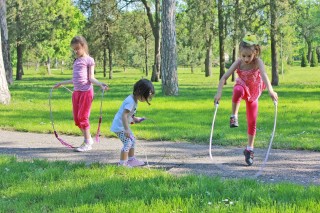Slip and slides and swing set slides are fun additions to summer vacation. But there’s one kind of slide you should avoid: the summer slide. When kids are out of school and on summer vacation, they tend to lose over two months of knowledge from the school year before. This is commonly referred to as the “summer slide.”

And many parents are worried that with kids in and out of the classroom during the 2020/2021 school year due to quarantining or awaiting test results for COVID-19, students will need to stay engaged even more after missing so much official classroom time. Here are a few ways that you can help keep the summer slide from affecting your kids.
1. Get involved with a community education group, or create your own.
Many communities offer summer courses for kids to help them continue to learn and grow. Offerings may be virtual or still a bit limited this year due to COVID-19. These classes tend to be more interactive than the typical school model, plus they’re usually shorter than a normal school day. Community classes also give your kids the opportunity to stay connected with their friends or meet new pals during the summer months. Check with your local school districts, parks and rec departments or the closest YMCA to see if they plan to have any virtual summer program options. If they don’t, get together with some of your kids’ friends and their families to create your own virtual program with each family taking on some of the share of teaching. Have a friend’s parent who’s in the medical field teach science or an accounting friend lead a math workshop, for example. Know someone who’s crafty? Ask if they are willing to lead a weekly art class. Grandparents love to help and can offer their crafting, cooking, music or history skills in during weekly lessons. What a fun way to stay connected with family and help combat loneliness in seniors.

2. Go on a family field trip.
Unlike last summer, most local museums, aquariums or zoos have reopened with precautions like scheduled ticketed entry. Many are beginning to lift mask restrictions by July 1. If you can’t get tickets for the day and time you want, you can still schedule family time for some virtual field trips. Checking out museums, zoos and safaris and even touring theme parks virtually will allow you to quickly and affordably travel farther than you normally could have in one summer. Better yet, plan a monthly excursion to one of these fun and educational destinations, and have your child keep a journal of their experiences. Have the kids take part in the planning and create a summer bucket list they help design. If you want to get away from the screen and out of the house, try a hiking or biking field trip to one of Michigan’s beautiful parks or beaches (pack your own food for a fun picnic). Not only will this mean fun family outings for everyone, but your child will be able to expand their mind and knowledge and learn a bit about history, wildlife and other topics they find interesting. Bonus: when they go back to school, they can share their experiences with their friends.
3. Plant a garden.
There’s nothing more satisfying than seeing the literal fruits (and veggies) of your labor. Planting a garden teaches your child responsibility and patience—plus, it’s fun. Watch the plants grow and you may eventually be able to use them in your meals if you plant vegetables or herbs. Your kids will feel pride knowing they accomplished something that you were then able to use in your everyday life. Plus, gardening is a healthy outdoor activity for the whole family—providing a variety of health benefits including weight loss, decreased stress and lower blood pressure.

4. Keep skills strong through play.
Play a math game or use flashcards to keep your child’s number skills top notch. Just as you have to practice to be good at a sport, math skills must be practiced in order to get better. There are tons of games and flashcards available today that enhance a child’s math skills, including free online options. You can also schedule a fun weekly family game night (try playing outside for a fun twist) with board games or card games that use numbers such as UNO, Monopoly, Life, Yahtzee and more. And when you’re hitting the road for those summer road trips, bring along some games for the car that develop the brain in many ways—there are dozens of free, printable games out there. Schedule dedicated time each week to play and learn.
5. Read something every day.
Reading is a hobby that should be nurtured and encouraged year-round. Kids who read at least six books during the summer months went back to school better prepared for the year ahead and needed less time to get back into the school work routine. Plus, reading expands one’s mind and helps to grow imagination. Reading just 20 minutes each day will help increase your child’s reading tests scores and expose them to 1.8 million words a year. To make it a challenge, consider joining your local library’s summer reading program with challenges that offer prizes as incentives. Or, create your own reward system for dedicated daily reading like a chart or tickets in a jar with prizes for total minutes read. Adults should read daily too, there are numerous health benefits to getting into a good book.
Don’t let your child fall behind during the summer months. Have fun and keep their brains active to avoid the summer slide so they can succeed and keep their brains active year-round.


